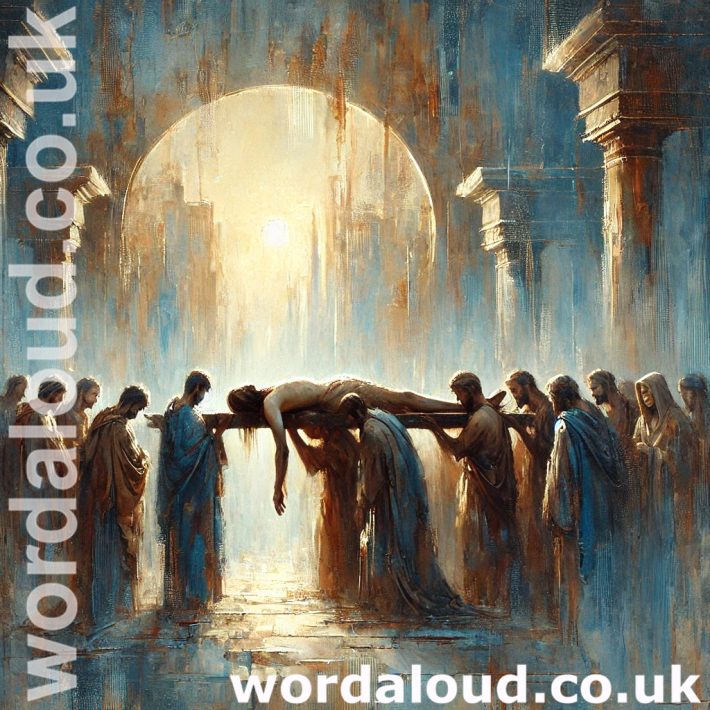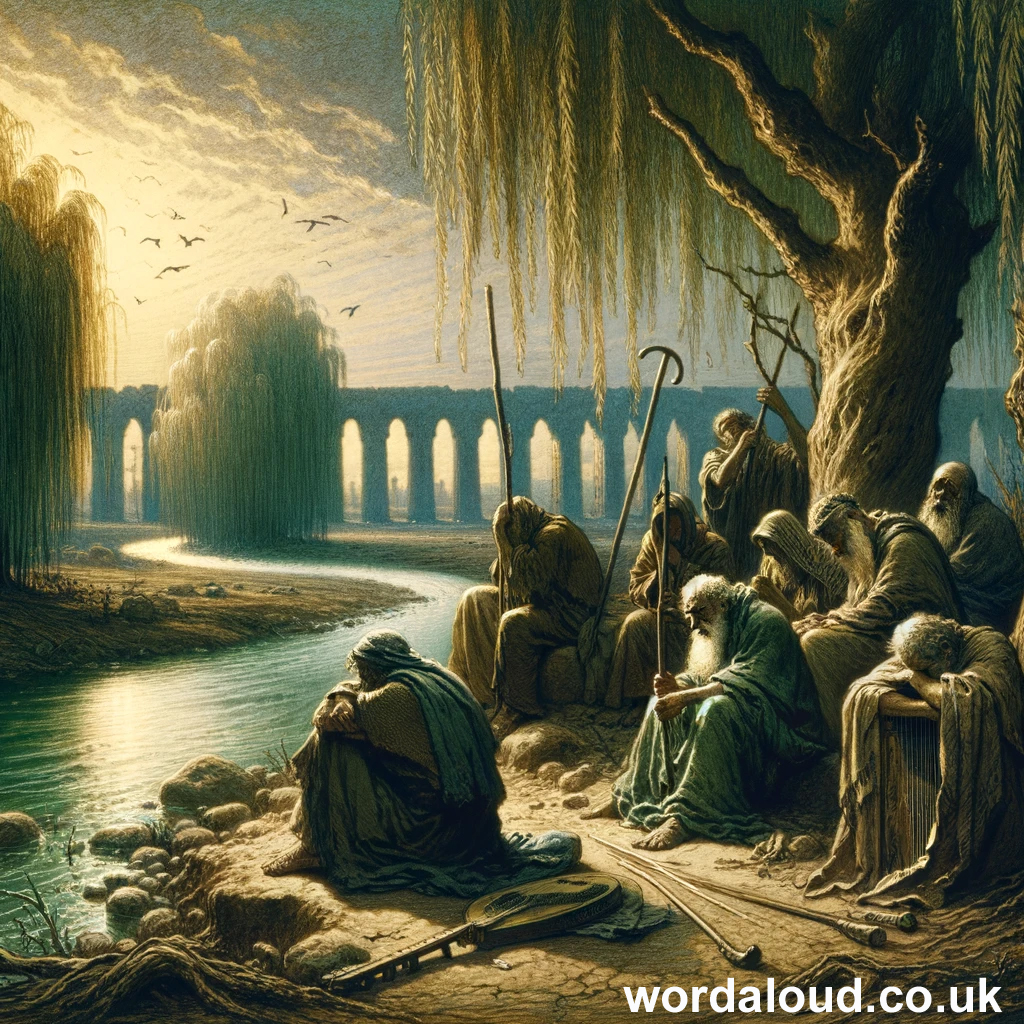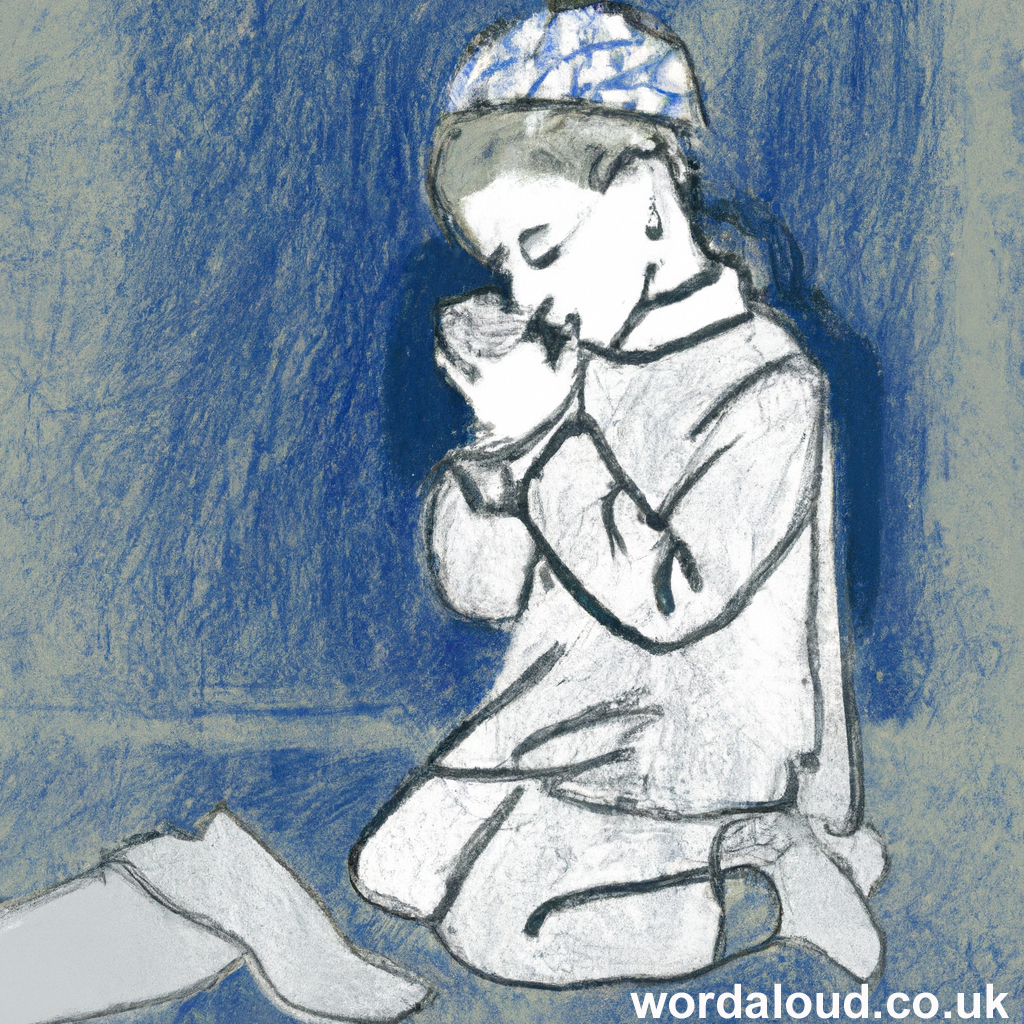Christian Art | Jesus Died | He Descended Into Hell | Harrowing Of Hell
Office Of Readings | Holy Saturday | A Reading From An Ancient Homily For Holy Saturday
‘The Lord’s descent into hell.’
Commentary | Jesus Descended Into Hell | Harrowing Of Hell
Holy Saturday is unlike any other day in the liturgical year. It is a day suspended between death and life, darkness and light, silence and song. This ancient homily for Holy Saturday enters deeply into that liminal space—the moment when Christ, having died on the cross, descends to the realm of the dead. In doing so, it invites us into the mystery of the Harrowing of Hell: Christ’s triumphant entry into the underworld to liberate those held captive by death since the dawn of time.
The homily opens with a powerful, almost cinematic stillness: ‘There is a great silence on earth today, a great silence and stillness.’ This moment of silence is not empty, but holy. The King is asleep—but this sleep is not defeat; it is the silence of divine work hidden from view. The earth has ‘trembled and is still’ because God has truly died in the flesh. But his death is not passive. It is purposeful. Even in death, God is active.
Christ Descends With Authority And Compassion
The centrepiece of the homily is Christ’s descent into the underworld—not as a victim, but as a victor. He comes not with the weapons of war, but with the weapon of his cross. He comes not in vengeance, but in compassion. His mission is clear: to seek out Adam and Eve, ‘as for a lost sheep’, and raise them from their sleep in death.
This is where the homily becomes most moving and dramatic. We witness a conversation between Christ and Adam, presented in liturgical language: Adam greets Christ with, ‘My Lord be with you all,’ and Christ responds, ‘And with your spirit.’ The descent into hell becomes a kind of liturgy, a Mass in the underworld, where the Eucharist is not bread and wine but the body of the Crucified One himself.
This moment has deep roots in early Christian theology. As early as the second century, theologians like Irenaeus taught that Christ’s saving work extended to the righteous dead (cf. Against Heresies 4.27.2). The Harrowing of Hell became a popular theme in Christian iconography and hymnody, especially in the Eastern Church, where icons often depict Christ breaking down the doors of Hades, grasping Adam and Eve by the hand, and leading them into light.
Adam’s Restoration And Ours
The theological heart of the homily is the radical reversal of Adam’s fall. Every detail of Christ’s Passion is presented as a deliberate undoing of the damage caused by sin. Christ says to Adam:
‘See on my face the spittle I received in order to restore to you the life I once breathed into you.’
Here, suffering becomes redemptive. Christ bears shame to heal our shame, endures blows to restore our dignity, is nailed to the tree to reverse the curse of Eden’s tree. The typology is rich and intentional. Just as Eve was taken from the sleeping Adam’s side, so the Church is born from Christ’s pierced side. As Adam slept in paradise, Christ sleeps in death—but his sleep awakens the world.
This language reflects a deep strand of patristic theology, especially in the writings of early Church Fathers like Melito of Sardis and Gregory of Nyssa. The entire drama of salvation is a cosmic healing: Adam, the archetype of humanity, is not merely pardoned, but raised and enthroned.
‘Rise, Let Us Leave This Place’
Perhaps the most striking and beautiful moment in the homily is when Christ speaks personally to Adam:
‘I did not create you to be held a prisoner in hell. Rise from the dead, for I am the life of the dead… Rise, let us leave this place.’
These are not only words for Adam. They are words for every human soul who has ever felt trapped in sin, sorrow, or despair. The voice of Christ in the underworld is the voice of hope, the divine summons calling us out of our graves—spiritual, emotional, or otherwise.
This is what makes Holy Saturday so spiritually powerful. On this day, Christ descends to the deepest depths—not only of death, but of human experience. He does not merely sympathize with our pain; he enters it. He goes to the furthest place a human can go—into death—and fills even that place with divine presence.
Fulfilment Of The Promise
The homily ends not with Christ returning to Eden, but with something greater: he does not restore Adam to the garden, but promises to enthrone him in heaven. Paradise is surpassed. The cherubim no longer guard the way with flaming swords—they now serve as ministers in the wedding feast of the Lamb.
Here we see a key theme of Christian theology: Christ does not simply bring humanity back to its original state. He elevates it. As Paul writes in Romans 5: ‘Where sin increased, grace abounded all the more.’ Christ not only heals the wound of sin—he glorifies the one who was wounded.
Mystery Of Holy Saturday
This homily draws us into the heart of Holy Saturday. It is a day of silence, but not of absence. It is a day of death, but not of despair. It is a day in which the Church does not celebrate the Eucharist—but waits in hope for the dawn of resurrection. In that waiting, we remember that even in death, Christ is at work. Even in silence, God speaks.
Through this profound and poetic meditation, we are reminded that salvation is not merely transactional, but transformational. Christ has not simply paid a debt—he has shattered the prison doors of death, and leads us by the hand into eternal life.
In the words of the homily, spoken from Christ to Adam—and to us:
‘I am in you and you are in me; together we form only one person and we cannot be separated.’
And that is the true meaning of Easter: not only that Christ is risen, but that he has come to raise us with him.

A Reading From An Ancient Homily For Holy Saturday
Something strange is happening – there is a great silence on earth today, a great silence and stillness. The whole earth keeps silence because the King is asleep. The earth trembled and is still because God has fallen asleep in the flesh and he has raised up all who have slept ever since the world began. God has died in the flesh and hell trembles with fear.
He has gone to search for our first parent, as for a lost sheep. Greatly desiring to visit those who live in darkness and in the shadow of death, he has gone to free from sorrow the captives Adam and Eve, he who is both God and the son of Eve. The Lord approached them bearing the cross, the weapon that had won him the victory. At the sight of him Adam, the first man he had created, struck his breast in terror and cried out to everyone: ‘My Lord be with you all.’ Christ answered him: ‘And with your spirit.’ He took him by the hand and raised him up, saying: ‘Awake, O sleeper, and rise from the dead, and Christ will give you light.’
I am your God, who for your sake have become your son. Out of love for you and for your descendants I now by my own authority command all who are held in bondage to come forth, all who are in darkness to be enlightened, all who are sleeping to arise. I order you, O sleeper, to awake. I did not create you to be held a prisoner in hell. Rise from the dead, for I am the life of the dead. Rise up, work of my hands, you who were created in my image. Rise, let us leave this place, for you are in me and I am in you; together we form only one person and we cannot be separated. For your sake I, your God, became your son; I, the Lord, took the form of a slave; I, whose home is above the heavens, descended to the earth and beneath the earth. For your sake, for the sake of man, I became like a man without help, free among the dead. For the sake of you, who left a garden, I was betrayed to the Jews in a garden, and I was crucified in a garden.
See on my face the spittle I received in order to restore to you the life I once breathed into you. See there the marks of the blows I received in order to refashion your warped nature in my image. On my back see the marks of the scourging I endured to remove the burden of sin that weighs upon your back. See my hands, nailed firmly to a tree, for you who once wickedly stretched out your hand to a tree.
I slept on the cross and a sword pierced my side for you who slept in paradise and brought forth Eve from your side. My side has healed the pain in yours. My sleep will rouse you from your sleep in hell. The sword that pierced me has sheathed the sword that was turned against you.
Rise, let us leave this place. The enemy led you out of the earthly paradise. I will not restore you to that paradise, but I will enthrone you in heaven. I forbade you the tree that was only a symbol of life, but see, I who am life itself am now one with you. I appointed cherubim to guard you as slaves are guarded, but now I make them worship you as God. The throne formed by cherubim awaits you, its bearers swift and eager. The bridal chamber is adorned, the banquet is ready, the eternal dwelling places are prepared, the treasure houses of all good things lie open. The kingdom of heaven has been prepared for you from all eternity.








